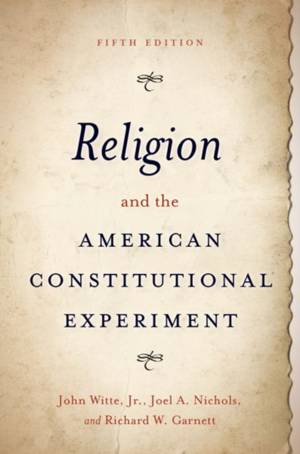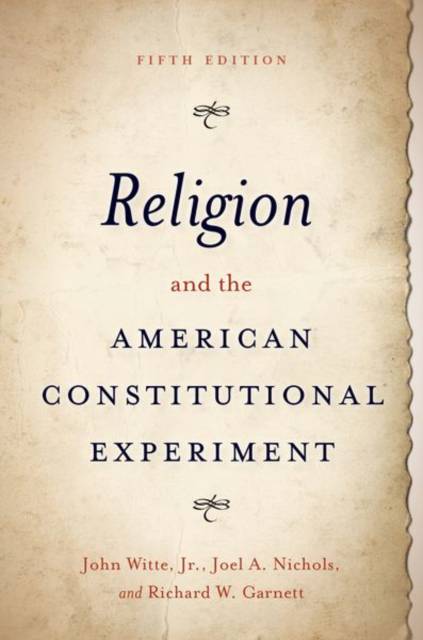
- Afhalen na 1 uur in een winkel met voorraad
- Gratis thuislevering in België vanaf € 30
- Ruim aanbod met 7 miljoen producten
- Afhalen na 1 uur in een winkel met voorraad
- Gratis thuislevering in België vanaf € 30
- Ruim aanbod met 7 miljoen producten
Zoeken
Religion and the American Constitutional Experiment
John Witte, Joel A Nichols, Richard W Garnett
Hardcover | Engels
€ 148,45
+ 296 punten
Uitvoering
Omschrijving
This accessible and authoritative introduction tells the American story of religious liberty from its colonial beginnings to the latest Supreme Court cases. The authors analyze closely the formation of the First Amendment religion clauses and describe the unique and enduring principles of the
American experiment in religious freedom - liberty of conscience, free exercise of religion, religious equality, religious pluralism, separation of church and state, and no establishment of religion. Successive chapters map all of the 240+ Supreme Court cases on religious freedom - covering the free
exercise of religion; the roles of government and religion in education; the place of religion in public life; and the interaction of religious organizations and the state. The concluding reflections argue that protecting religious freedom is critical for democratic order and constitutional rule of
law, even if it needs judicious balancing with other fundamental rights and state interests. Clear, comprehensive, multidisciplinary, and balanced, this classic volume is an ideal classroom text. This new 5th edition addresses fully the new hot-button issues and cases on religious freedom versus sexual liberty; religious worship in the time of COVID; freedom of conscience and exemption
claims; state aid to religion; religious monuments and ceremonies in public life; and the rights and limits of religious groups.
American experiment in religious freedom - liberty of conscience, free exercise of religion, religious equality, religious pluralism, separation of church and state, and no establishment of religion. Successive chapters map all of the 240+ Supreme Court cases on religious freedom - covering the free
exercise of religion; the roles of government and religion in education; the place of religion in public life; and the interaction of religious organizations and the state. The concluding reflections argue that protecting religious freedom is critical for democratic order and constitutional rule of
law, even if it needs judicious balancing with other fundamental rights and state interests. Clear, comprehensive, multidisciplinary, and balanced, this classic volume is an ideal classroom text. This new 5th edition addresses fully the new hot-button issues and cases on religious freedom versus sexual liberty; religious worship in the time of COVID; freedom of conscience and exemption
claims; state aid to religion; religious monuments and ceremonies in public life; and the rights and limits of religious groups.
Specificaties
Betrokkenen
- Auteur(s):
- Uitgeverij:
Inhoud
- Aantal bladzijden:
- 460
- Taal:
- Engels
Eigenschappen
- Productcode (EAN):
- 9780197587614
- Verschijningsdatum:
- 27/05/2022
- Uitvoering:
- Hardcover
- Formaat:
- Genaaid
- Afmetingen:
- 159 mm x 241 mm
- Gewicht:
- 771 g

Alleen bij Standaard Boekhandel
+ 296 punten op je klantenkaart van Standaard Boekhandel
Beoordelingen
We publiceren alleen reviews die voldoen aan de voorwaarden voor reviews. Bekijk onze voorwaarden voor reviews.











